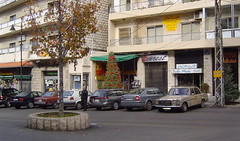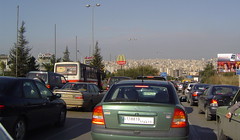
Christmas in Aley
Originally uploaded by Jane Rubio.
So for a Druze community, the Christmas decorations are out in full force. Little white and colored lights everywhere. Santa Clauses on front lawns. The shops in the souk have Christmas trees and garland. Red and green galore.
There were no decorations or lights during Ramadan.
The Druze say they’re not Muslim. Though officially and historically, the religion developed in the 1000's in Fatimad Egypt as an offshoot of an Ismaili Shiite sect. But to me, it seems that many are wanna-be Christian. My Druze students are for the most part very anti-Muslim and have a strong affinity for Christians. One day, a kid yelled out, "Who thinks Christian is better than Muslim?" And the whole 7th grade class raised their hands. This kid also said Christian is better than Druze.
Some Druze go to church. It might be a function of not being able to go to their own house of worship or to know a lot of the substance of their religion, unless they decide to become “religious." (The Druze are a bifurcated society where about 10% choose to become religious. It entails having to dress a certain way and attend certain religious ceremonies.)
Since the Druze religion is philosophically esoteric, Bahai-like, believing in aspects of all religions, many don’t see a problem with going to church or to mosque. Because theirs is the final revelation, all the previous revelations are shadows of the true Druze religion. So officially Druze can participate in other religious services.
However, much of the affinity towards Christianity has to do with social status and class. Christians are at the top; Muslims are on the bottom. The Druze are probably somewhere in between, even though many would claim they're on the bottom. Christian culture is associated with open, modern, Western ways, while Muslims are often associated with Palestinian refugees, Hezbollah, and the all-hated "dirty" Syrians.
Of course, not all the Druze are anti-Muslim. I have plenty of friends who have Muslim friends and Qurans and even go to mosque. But I am often surprised by how positively I am received by this community because I am a Christian. I don't think it would be same were I Muslim.

